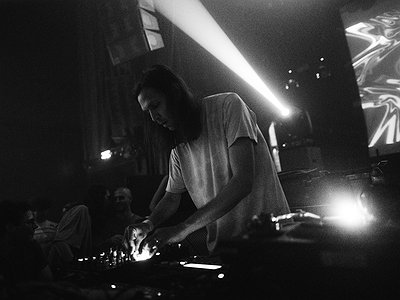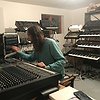Part 1
Name: Edward Upton aka DMX Krew
Nationality: British
Occupation: Producer, DJ
Current release: DMX Krew's new four-track EP Return to Jupiter is out via Gudu.
Recommendations: TR-808 is the best sounding drum machine. Fender Rhodes is a great keyboard to write songs on.
If you enjoyed this DMX Krew interview and would like to stay up to date with his music, visit his official website. He is also on twitter, and Soundcloud.
The views of society towards technology have changed considerably over the years. How would you describe yours?
I suppose I like technology when it helps me to do what I want but I am suspicious of technology when it makes things worse for people. In general I am a very late adopter of everything that comes out. I use the computer for email, accounts, simple audio recording and chess.
In music and probably other creative endeavours, I think it is important (and can be very difficult) to work out which aspects of technology help you to express yourself and which ones maybe seem to make things easier but actually do nothing to improve the expression.
On reflection, maybe it’s the same with things like social media or even on-demand entertainment: how much of using it is beneficial to you and how much is just wasting your limited time on the planet fiddling about when you could be getting on with something?
What are currently your creative goals and how are technologies helping you reach them?
I just try to make music whenever I get some time. The reason I do it is just to express all the ideas that keep appearing in my mind. It makes me happy. These days I have 3 small children so I can rarely have long studio sessions and have been learning how to make music spread over many short chunks of time.
Technology is helping because I can record stuff in a computer and come back to it later, multitrack everything basically for free. When I started I was either recording complete tracks live or using analogue 8 track tape which was really expensive and inconvenient in a lot of ways.
Also I like the modern all-in-one groovebox type products for creating ideas really quickly to finish later.
How and for what reasons has your music set-up evolved over the years and what are currently some of the most important pieces of gear and software for you?
When I started it was very hard to find gear and even harder to find any information about it. So I used to just buy synths that were cheap and available locally. I ended up with a few cool analogue synths that were cheap in those days and are still the centre of my set up. Over the years I gradually added more things but they are not mostly necessary, just fun to try different flavours of sound.
Also, as I mentioned above, I create a lot of ideas really quickly on a groovebox (NI Maschine+) and then later record them and maybe flesh them out with some analogue sounds. I love this machine because it’s fast like an old MPC but with much better sound, plus you can run Reaktor ensembles on it so you can have your own custom synths and sounds that nobody else has.
Having a computer for basically unlimited multitrack recording is great but I rarely use the computer for anything more complex than recording one audio track at a time. I still don’t like to look at a big screen when I am trying to be creative.
Have there been technologies which have profoundly influenced, changed or questioned the way you make music?
Yes. I grew up in the 80s and the big thing for me was cheap Casio and Yamaha keyboards that you could buy in a high street electronics shop. These things were just as important for my development as hearing Kraftwerk or Detroit techno or whatever. I don’t think I would have been so interested in music if we had just had a piano. I guess mine was the first generation that grew up with access to those sounds for non-zillionaires.
By the time computers were powerful enough to do music stuff on, I already had enough gear so it wasn’t such a big deal for me. It’s nice that computers are cheap today and being able to have unlimited mixing and EQ and dynamics processing is amazing, and I could stop buying and storing tape.
From my point of view, the three key factors which have driven music technology over the past decades are mobility, affordability, and (easy) usability. How important are these for your own work – and did I miss any?
I agree apart from usability. I think modern music devices suffer from being crammed with too may features that makes them less immediate and satisfying for self-expression. The manufacturers listen too much to all the people on forums who love to offer opinions but don’t actually make a lot of music.
As an example, look at things like the Roland TR-808 or SH-101. Absolutely simple but fantastic-sounding things that you can use again an again without getting tired of them. No menus, no thinking involved in using them.
The main thing of course is computers that cost very little and can do almost anything. I feel we need to improve the interface of computers for music which I guess is why we see these Raspberry-pi based instruments like the recent Korg hardware synths which are identical to the software versions but a lot more fun to use.
Also probably people who design computer-based tools ought to move away from skeumorphic imitations of old gear and try innovating a bit more :) I imagine they know what sells though.
Technology is usually associated with innovation and progress. Are these also important considerations for your music? What is the relation between innovative tools and "innovative music"?
Yes I partly agree but the changes in the nature of electronic instruments have been quite incremental lately and more about price and size than anything revolutionary in terms of sound or musical possibilities.
As a child, hearing early records with sampling and digital drum machines was absolutely astounding. You can’t imagine. I don’t think there has been another moment like that in terms of sounds, only in the three criteria you mentioned above.
I think creative people will innovate when there are new tools, and they will also innovate when there aren’t. Stuff like the Art Of Noise or Kraftwerk was amazing in its time using cutting edge synths and samplers, but also things like Aphex Twin and Drexciya were really groundbreaking in the 90s using mostly secondhand 80s technology.
Personally I don’t feel like I have been a great musical innovator but I always try to add my personal twist to the music I make. So I can’t claim to have made any great artistic leaps forward but I feel my stuff doesn’t sound like other people. It’s up to you if that’s a good or bad thing :) Often I just try and mix different styles of music that I haven’t heard combined before. Small innovations.
As I get older I have to balance the desire to make some music and the desire to do new things in music. Because innovation is difficult, when you’ve already done a lot you sometimes get stuck, and the only way to get unstuck is to just bang out some kicking techno or something. I am learning to accept that.
New sounds from old tools:
Late producer SOPHIE said: “You have the possibility with electronic music to generate any texture, and any sound. So why would any musician want to limit themselves?” What's your take on that and the relevance of limitations in your set-up and process?
I thought Sophie was fantastic. It’s very rare to hear that kind of innovation combined with being so accessible and fun. Most experimental music doesn’t interest me because I am simple and I like catchy tunes, pop and techno, but I love to hear exciting new sounds within accessible music. I got that from synth pop and then from hip hop, house and techno and rave, and later from UK garage and early grime / dubstep.
BUT there’s nothing wrong with just wanting to write songs on the guitar or make acid with a 909 and a 303. It’s all self-expression. You can innovate in other ways than technological means, it’s just harder! Limiting yourself to a few tools or sounds can help force you to be more creative in terms of composition ideas etc. and also help you to do it quickly which is great if you are bursting with ideas.
Here is a track I made using an MPC and one old synth, sitting outdoors in some woods in Austria. I think the limitation (and the environment) helped me go somewhere that was new for me:






